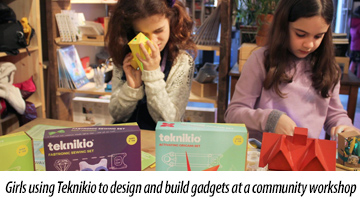#WhyIMake: Find your inner maker
By Sibel Deren Guler | May 03, 2017
Sibel Deren Guler is a physicist, designer, and educator based in New York. She is an Infy Maker Award Winner for her Teknikio project. She researches and develops technology that uses interactivity and computation to explore nature from a playful and sustainable approach.
On the cover of my planner there is a sticker that reads "We are all makers". I wholeheartedly believe this statement to be true, but unfortunately I don’t think that we all feel that way. I’ve been practicing making all of my life and over the past 10 years I’ve become more interested in trying to solve the problem of why there is a lack of confidence around making. The "maker movement" perhaps unintentionally has created a brand around making that has put a large emphasis on electronics and technology, while making at its core is simply the act of creating something out of parts, whether those parts be milk and eggs, or wires and magnets. It is not a measure of the quality or importance of the objects created, but the act, the ability to put these things together.
I studied physics in college and was always drawn to art and design. I took courses in photography and physical computing to explore these fields and became fascinated by the intersection of science and art. My projects in grad school, where I studied Computational Design included energy-harvesting playgrounds, air-quality sensing kits, and interactive maps.
My journey continued with a quest to make a gender-neutral beginner’s toolset for combining craft with technology, accessible to ages 8-108. At the time, I felt that there was no kit on the market that incorporated all of these characteristics while successfully attracting girls. Over time, this project has evolved into a retail product and includes a line of several toolsets under the brand Teknikio. Along with a retail line, we offer workshop sets which are being continuously enhanced with additional resources for educators. We hope to have a deeper impact on future makers with our education partners.

At Teknikio, we try to create a balance, a comfortable way for people to level up their making, engineering, and design skills. This balance is about finding ways to foster creative confidence. If a project set is too open ended the user may feel lost and worse yet, incapable of figuring out how to make something out of the parts. This is based on my experience when teaching beginner electronics to undergraduate students. The toolsets they were using in class were very comprehensive and yet students would feel overwhelmed and resort to making something simple using the least amount of parts necessary for their project. On the other hand, if a project is too prescribed, the user may feel like they were able to create and make, but might not feel ownership of the end product. We have observed that when a student is able to design his/her own project, the result is excitement, plus a deeper understanding of STEM concepts.
A critical part of Teknikio’s mission is close the gender gap in STEM fields. Research shows that one of the reasons there are so few women in STEM is that they give up on themselves more easily. An international study by the Organisation for Economic Cooperation and Development found that girls were more nervous and anxious than boys about their abilities to excel in science and math. Though there are a number of factors for why this is the case, I believe that by empowering girls at a young age, by giving them experiences where they do take pride in their skills, we can solve this problem. I make because I want to help others find and recognize the maker in themselves.

